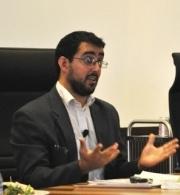Sudan: The Intifada Jubilee
Today is the twenty-fifth anniversary of the popular uprising that brought down the dictatorship of President Jaafar Nimeiri, setting the stage for Sudan’s last multi-party elections exactly a year later. It was a model non-violent people’s revolution.
The intifada was an extraordinary organizational feat. The prime movers were trade unions and professional associations. Although some army officers were sympathetic to their cause, the leaders of the civil disobedience movement did not know who they were, and decided not to involve the military at all in their planning. Across the towns and cities of Sudan, each trade union or professional association formed a steering committee, with the doctors, lawyers (both the Bar and the judiciary), engineers and university lecturers forming an overall steering committee for the planned campaign of strikes. Each union had not only one committee, but a second or shadow committee as well, to take over in case the leading committee members were arrested. The experience of civil disobedience over the previous months had shown that if the tactic were to be effective, it would need to be coordinated across all sectors.
In 1985, Sudan had no cellphones and landlines were unreliable. The organization of the strikes required a mixture of clandestine meetings, distributing pamphlets and statements by hand, and two-way radios. The strikes, demonstrations and petitions looked like a spontaneous outpouring of citizens’ outrage and demand for change. The outrage and commitment to democracy ran deep, but the organization was meticulous.
The strikes began on 27 March, sparked by price rises, with protests outside the Nimeiri Cooperative Society and the Islamic Banks. On 1 and 2 April, the security forces arrested most of the steering committee members, so that leadership passed to the shadow or alternate committees. By this time, the momentum of the strikes meant that the demands of the leadership were increasing. The leaders of the strikes would no longer accept a reversal of the recently-announced price increases, but were demanding that Nimeiri hand over power. Petitions were handed to government authorities across the country.
The Sudan Socialist Union declared a counter-demonstration for 2 April. The SSU turnout was small. One reason was that even SSU militants were deeply embarrassed by the government’s refusal to admit that drought and famine were striking Kordofan and Darfur, and to provide relief for the thousands of destitute migrants in the streets of Omdurman. That same day, Nimeiri left to visit Washington DC to obtain an American bailout. On his way to the airport, street children through stones at his motorcade–the closest the uprising came to any act of violence.
On 4 April, the call went out for a general strike. The security services responded with arrests of the professionals who were coordinating the uprising. But at this point the momentum was unstoppable: public sector and bank employees came out on strike, bringing all economic activity to a halt. The leaders of the uprising had expected a long struggle and had prepared themselves, psychologically and organizationally, for severe repression and resistance. But suddenly they sensed that victory lay within their grasp.
On 5 April, the intifada leadership declared Khartoum a “dead city,” along with other major towns. The stay-at-home was a resounding success. The streets of the capital and other cities were deserted. The depth of support for the opposition was shown, along with its formidable organizational capability. But the trade unionists were not idle. For example, the air traffic controllers’ union made sure that one of their most committed members was on duty that night to close Sudanese airspace to prevent Nimeiri’s plane from bringing the president home. The following day, as the demonstrations were set to resume, the army stepped in.
Few of those who organized the popular uprising were, or became, professional politicians. They were overwhelmingly drawn from civil society, the professions, and the trade unions. They mobilized popular sentiment against the war, the famine, and the abuses of Nimeiri’s police state, swept away the dictatorship, and then stepped aside for Sudan’s opposition leaders to take centre stage.






Dear Alex,
April 1985 uprising shows how Sudanese can mobilised to make change happened, but in the two cases of popular uprising they failed to achieve the changes needed to reform our society and politics and also bring real sustainable democracy. Gen. Soar Al Dahab military council stepped in on the 6th April 1985 to kill the upraising and prevent real changes and succeed in killing the hope and aspiration of millions of Sudanese and later served the interest of the National Islamic Front by bringing election law which design to help them win many seats in April 1986 election, and also prevent real accountability to those whom committed serious crimes and abuse of power during Nimari regime. That why have been later rewarded by being appointed as head of the Organisation of Islamic Preaching (Daawa), and now he is the head of Al Bashir Election campaign.
The political wrangling between Sudanese sectarian political parties also play major part in derailing the whole process of real reform, they always only looking for achieving their very narrow self interest at the expense of what good for all the wrangling those days brought us back to those days and reminded us with the many lost opportunities, as we are watching the disintegration of our country.
Those were heady days. And where are those trade unions and professionals now? Many of those who led the rebellion are in exile or dead. The professional societies have been destroyed by spying and infighting.